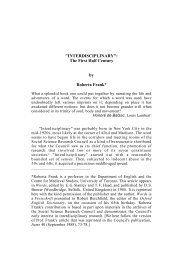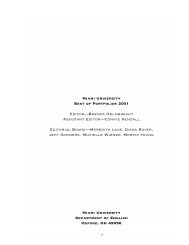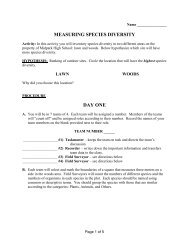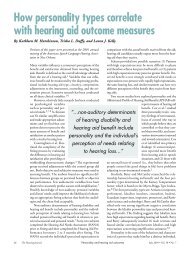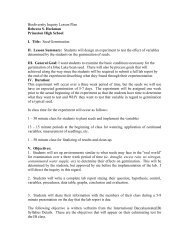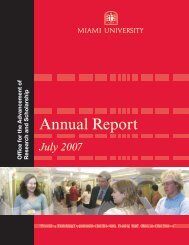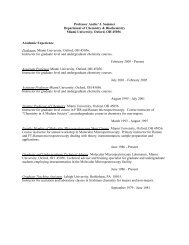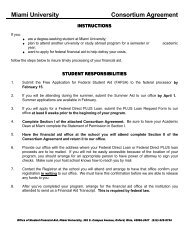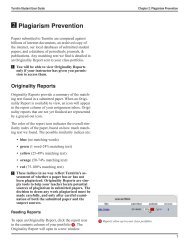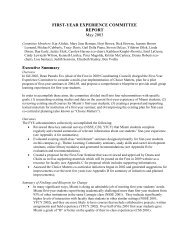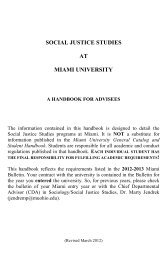Interdisciplinary Research Manual - Units.muohio.edu
Interdisciplinary Research Manual - Units.muohio.edu
Interdisciplinary Research Manual - Units.muohio.edu
You also want an ePaper? Increase the reach of your titles
YUMPU automatically turns print PDFs into web optimized ePapers that Google loves.
45<br />
you came to write your project, why the topic or problem is important to you, how the<br />
project fits into your life. It’s a personal statement. The introduction, in contrast, is about<br />
the subject matter of the project—the topic, issues, positions, and perspectives—not<br />
about you. Its focus is intellectual and scholarly, not personal. The preface can be<br />
conversational in tone and should be written in the first person singular, while the<br />
introduction should have a formal tone.<br />
It’s appropriate anywhere in your project (including the introduction) to step back<br />
from your line of argument to interject an observation in the first person singular,<br />
especially to disclose a personal bias that the reader needs to know to make a fully<br />
informed evaluation of what you are saying. (If you do, be sure to make it clear that you<br />
have temporarily changed your rhetorical stance.) It’s also appropriate to interject<br />
personal examples (also written in the first person singular), though you should be clear<br />
that the strengths of personal examples are empathy and immediacy; they provide little in<br />
the way of evidence in support of your argument. One could even make a case for using<br />
the first person singular throughout an interdisciplinary project in order to draw the<br />
reader into the interdisciplinary reasoning process and to highlight the constructivist<br />
nature of the interdisciplinary approach. One rhetorical strategy that distinguishes<br />
interdisciplinary writing is the use of meta-discussion, where you step back from what is<br />
being said to examine the process by which the topic has been studied or the terms in<br />
which it is normally presented within that perspective. In short, you will have to spend<br />
some time talking about the disciplines and how they function, about not only what it is<br />
they have to say but why they say it.<br />
After you write a second chapter and you see its implications for the first chapter<br />
you wrote, should you go back and rewrite that chapter or should you wait until the entire<br />
rough draft is completed to revise? While it may appeal to your desire for neatness to<br />
rewrite as you go, it’s less efficient than rewriting the entire project all at once. Every<br />
chapter will have implications when you’ve finished writing it for all the previously<br />
written chapters. Indeed, even if you’ve done some integration as you go, when you pull<br />
the project all together in the conclusion you are likely to realize for the first time exactly<br />
how the other chapters fit together and thus how they need to be rewritten. You can’t<br />
rewrite any one chapter for sure until you understand exactly how it relates to all the<br />
other chapters and what it contributes to the whole, and you won’t know either one until<br />
you’ve completed the rough draft. Then you may realize that a section may need to be<br />
switched to another chapter, that material you thought you wouldn’t use must be added,<br />
or material that seemed central now becomes more peripheral and needs to be shifted to a<br />
less prominent location within the chapter or removed altogether. The one exception is<br />
cleaning up the mechanics of spelling, punctuation, and grammar. When you get<br />
feedback on mechanics that applies to earlier chapters as well, it’s a good idea to make<br />
that correction in all the chapters you’ve written, simply because you’re more likely to<br />
develop the habit of doing it correctly if you practice it a bunch of times.<br />
What do you do when you’re studying a public policy problem in a less developed<br />
country (e.g., public health; economic, social, or political development; land use or<br />
environmental policies) and the relevant theoretical literature and the best practice<br />
techniques all come out of former colonial powers? You don’t want to be a neocolonialist<br />
or engage in cultural hegemony by looking, for example, at an African<br />
problem through an American lens and arguing that Ghana should be more like the



